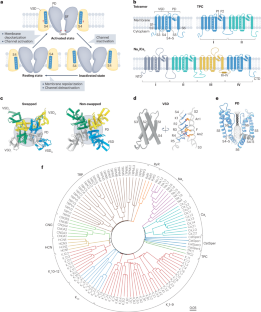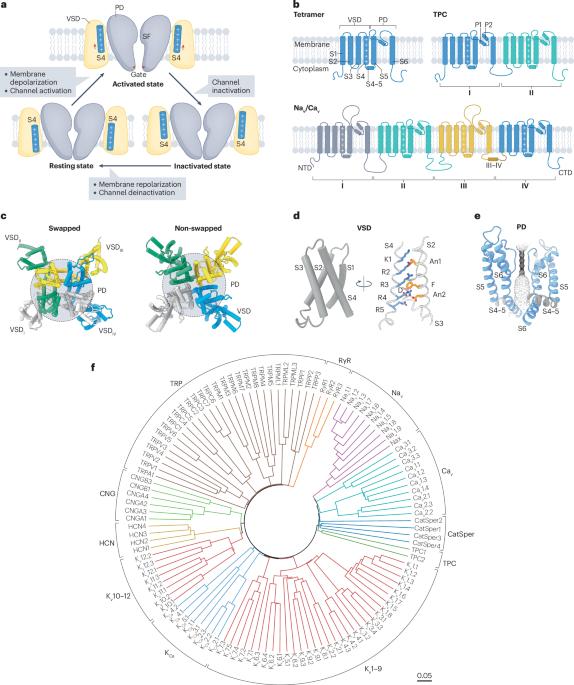Structural biology and molecular pharmacology of voltage-gated ion channels
IF 81.3
1区 生物学
Q1 CELL BIOLOGY
引用次数: 0
Abstract
Voltage-gated ion channels (VGICs), including those for Na+, Ca2+ and K+, selectively permeate ions across the cell membrane in response to changes in membrane potential, thus participating in physiological processes involving electrical signalling, such as neurotransmission, muscle contraction and hormone secretion. Aberrant function or dysregulation of VGICs is associated with a diversity of neurological, psychiatric, cardiovascular and muscular disorders, and approximately 10% of FDA-approved drugs directly target VGICs. Understanding the structure–function relationship of VGICs is crucial for our comprehension of their working mechanisms and role in diseases. In this Review, we discuss how advances in single-particle cryo-electron microscopy have afforded unprecedented structural insights into VGICs, especially on their interactions with clinical and investigational drugs. We present a comprehensive overview of the recent advances in the structural biology of VGICs, with a focus on how prototypical drugs and toxins modulate VGIC activities. We explore how these structures elucidate the molecular basis for drug actions, reveal novel pharmacological sites, and provide critical clues to future drug discovery. Voltage-gated ion channels (VGICs) regulate ion permeability in multiple physiological processes, thereby representing important disease targets. This Review discusses how advances in cryo-electron microscopy have contributed to our understanding of VGIC structures and mechanisms and their interactions with drugs.


电压门控离子通道的结构生物学和分子药理学。
电压门控离子通道(VGIC),包括 Na+、Ca2+ 和 K+离子通道,可根据膜电位的变化选择性地将离子透过细胞膜,从而参与神经传递、肌肉收缩和激素分泌等涉及电信号的生理过程。VGIC 的功能异常或失调与多种神经、精神、心血管和肌肉疾病有关,大约 10% 的 FDA 批准药物直接针对 VGIC。了解 VGIC 的结构-功能关系对我们理解其工作机制和在疾病中的作用至关重要。在本综述中,我们将讨论单颗粒冷冻电镜技术的进步如何为我们提供了前所未有的 VGIC 结构洞察力,尤其是它们与临床药物和研究药物之间的相互作用。我们全面概述了 VGIC 结构生物学的最新进展,重点关注原型药物和毒素如何调节 VGIC 的活性。我们将探讨这些结构如何阐明药物作用的分子基础、揭示新的药理位点并为未来的药物发现提供重要线索。
本文章由计算机程序翻译,如有差异,请以英文原文为准。
求助全文
约1分钟内获得全文
求助全文
来源期刊
CiteScore
173.60
自引率
0.50%
发文量
118
审稿时长
6-12 weeks
期刊介绍:
Nature Reviews Molecular Cell Biology is a prestigious journal that aims to be the primary source of reviews and commentaries for the scientific communities it serves. The journal strives to publish articles that are authoritative, accessible, and enriched with easily understandable figures, tables, and other display items. The goal is to provide an unparalleled service to authors, referees, and readers, and the journal works diligently to maximize the usefulness and impact of each article. Nature Reviews Molecular Cell Biology publishes a variety of article types, including Reviews, Perspectives, Comments, and Research Highlights, all of which are relevant to molecular and cell biologists. The journal's broad scope ensures that the articles it publishes reach the widest possible audience.

 求助内容:
求助内容: 应助结果提醒方式:
应助结果提醒方式:


